If you are reading these rules for the first time, ignore the text along the right hand side. These rules serve as a summary to help you quickly familiarize yourself with the game.
Setup
Setting up the game is described in detail in the quick intro (download: www.pd-verlag.de/navegador).
This is a short summary:
1. Market
In the fourth row from the top, cubes marking the prices for sugar, gold and spices are placed.
2. Players
Each player starts with 2 ships of his color in Portugal, places his worker in Lisboa inside the column showing “3“,
and his game stone onto the middle of the rondel. In addition everyone receives 200 Cruzados, a King‘s privilege, the other five
ships into his supply, and a player sheet which is equipped with 1 factory (orange), 1 shipyard (brown) and 1 church (grey).
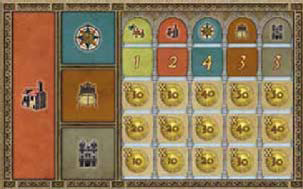
3. Colonies
Each region receives a hidden stack of randomly shuffled colony tokens.
4. Privileges
One privilege of each type is put inside each arch of the gallery.
5. Dangerous sea regions
In Nagasaki (with 2 and 3 players in Macau as well) a token for the extra loss of ships is placed.
6. Explorers
Each sea region except Portugal receives a teal round wooden disk.
7. Buildings
In the lower right corner of the game board the buildings are placed: Inside the upper
three lines 6 factories each for sugar, gold, and spices, and inside the lower 2 lines the
remaining shipyards and churches from left to right (with more than 2 players, the most
expensive fields are left free).
Player's Actions
There are 7 different actions which can be chosen on the rondel
(“Market“ exists twice):
Workers
For each own church one worker can be bought for 50 Cruzados each.
Additional workers cost X * 100 Cruzados, where X is the current
game phase. Each worker above 9 workers is then sold for 100
Cruzados each.
The player may recruit one new worker per church owned for
the price of 50 Cruzados each. Additional workers each cost 100
Cruzados per game phase (for instance 300 Cr. in phase III). The
new number of workers is tracked on the chart at Lisboa and the
costs are paid to the bank. The minimum possible number of workers
is 2, the maximum is 9.
If a player already has 9 workers in Lisboa, he cannot receive more.
In this case his churches may recruit virtual workers for 50 Cr. each,
which are sold instantly to the bank for 100 Cr. each, resulting in
a net gain of 50 Cr. per worker. It is necessary however to pay 50
Cruzados per worker in church beforehand.
Example recruit workers:
A player with 2 churches may recruit up
to 2 new workers for 50 Cr. each. For
2 workers he pays 100 Cr. to the bank
and moves with his marker in Lisboa 2
positions to the right. If he wants 3 new
workers in game phase II, he would
have to pay 300 Cruzados (2x50+200).
Example more than 9 workers:
A player owns 8 workers and 3 churches, he pays 150 Cruzados
for 3 workers. His worker in Lisboa moves to column “9”. For
the remaining 2 new workers he receives 200 Cruzados out of
the bank.
Ships
For each own shipyard one ship can be bought for 50 Cruzados each.
Additional ships cost X * 100 Cruzados, where X is the current
game phase. Each ship above 7 ships is then sold for 100
Cruzados each.
For ships the same prices are applied as for workers. The player
may build as many ships as he has shipyards for 50 Cruzados each.
Additional ships each cost 100 Cruzados per game phase paid to
the bank (100 in phase I, 200 in phase II, 300 in phase III). All new
ships are placed in the sea region of Portugal.
If a player already has all his 7 ships on the game board, he cannot
receive more. Additional ships produced with shipyards are sold instantly to
the bank for 100 Cruzados each, after having paid 50 per ship
beforehand.
Example building ships:
A player with 3 shipyards wants
to build 4 ships. The game is in
Phase I. He pays 250 Cruzados
(3x50+100) to the bank and
places 4 ships in Portugal.
Sailing
Each ship can sail up to X steps, where X is the current phase.
If a region with explorer marker is entered, the ship movement
ends there and a second (sometimes even a third) ship needs to
be moved there. When exploring such a region, 1 (or 2) ships are lost.
The colony tokens will be revealed and the player receives as much
money as the price of the cheapest revealed colony. Also, the player
receives the explorer disk. During one action "Sailing" only one region
can be explored.
The player may sail with all his ships into another sea region.
In game phase I a ship can cross only one border (blue or red) in
order to enter an adjacent region. In phase II it may cross up to two
and in phase III up to three borders during a single turn.
Several ships in the same region, regardless of their owner, do not
affect each other.
Explorer:
Unknown waters containing an explorer (round
wooden disk) cannot be entered by a single ship. A
minimum of 2 ships is required to enter that region
simultaneously, otherwise that region cannot be
entered. One of those ships is lost in the unknown
waters. At least one other ship has to remain in the newly discovered
region, even if it still should have the possibility to sail.
When exploring the player
-
takes one of the exploring ships back into the personal supply,
-
places the explorer disk from the board on his player sheet,
-
reveals the colony tokens from the corresponding stack, and
-
receives a bonus from the bank, amounting to the price for the
cheapest revealed colony.
The newly revealed colony tokens are displayed face up at the
region. It is not possible to explore more than one new sea region
per turn.
When exploring sea regions marked with the token for double loss
of ships (Nagasaki and maybe Macau), the player has to take back
2 ships instead of 1 into his supply. Accordingly, he needs at least
3 ships to enter that region.
Example Explorer:
Red sails from Guiné
and Rio de Janeiro into
the hitherto unknown
sea region of Angola.
He loses 1 ship, takes
the explorer disk on his
player sheet, and
reveals the colonies
stacked in Angola. As
the cheapest colony in Angola would
cost 70 Cruzados, he is paid a bonus of
70 Cruzados out of the bank.
Colony
Colonies can be bought for the displayed price, if for
each colony bought there is one own ship in the region
and two workers can be assigned.
The player may found one or more new colonies. He pays the prices
printed on the colony tokens to the bank and takes the respective
tokens into his personal supply. In addition the player has to meet
two requirements per new colony:
-
at least one own ship in the same region,
-
and two workers in Lisboa.
It does not cost ships or workers to found colonies, but every ship
and worker can be used only once per turn. For instance, to found
2 colonies in one region at the same time, the player has to be
present with at least 2 ships in that very region, and has to own at least
4 workers in Lisboa.
The prices for colonies are as follows:
-
Sugar (white): from 40 to 120 Cruzados,
-
Gold (yellow): from 50 to 150 Cruzados,
-
Spices (brown): from 60 to 180 Cruzados.
If a player has the choice, he will always found the cheapest colony,
because apart from their price colonies of the same type do not differ.
Example found colonies
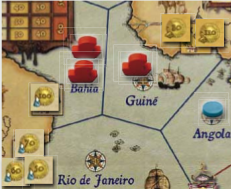 Red has 6
workers, 2 ships
in Bahia, and 1
ship in Guiné.
He can found
only 2 colonies,
one in Guiné (80
Cruzados) and
one in Bahia
(100 Cruzados).
He pays 180
Cruzados to the
bank and takes
both colony
tokens in his supply. If he had 2 ships in Guiné, he would be able
to found 3 colonies if he could afford them. He cannot found
colonies in Rio de Janeiro because he has no ship there. If he
had only 3 workers, he could found only 1 colony, because every
new colony requires the ownership of 2 workers.
Red has 6
workers, 2 ships
in Bahia, and 1
ship in Guiné.
He can found
only 2 colonies,
one in Guiné (80
Cruzados) and
one in Bahia
(100 Cruzados).
He pays 180
Cruzados to the
bank and takes
both colony
tokens in his supply. If he had 2 ships in Guiné, he would be able
to found 3 colonies if he could afford them. He cannot found
colonies in Rio de Janeiro because he has no ship there. If he
had only 3 workers, he could found only 1 colony, because every
new colony requires the ownership of 2 workers.
Buildings
The player can buy buildings for the displayed price.
Each factory also requires 3 workers, each shipyard
4 workers and each church 5 workers. Those workers
are not lost.
The player may build new factories, shipyards, and churches. He
pays the respective prices printed at the chart to the bank and places
the new buildings on his player sheet. In addition he needs
-
3 workers per new factory,
-
4 workers per new shipyard,
-
5 workers per new church.
His number of workers has to be sufficient for all new buildings
together. The number of workers in Lisboa remains unchanged, as
it does not cost workers to build.
Example buildings
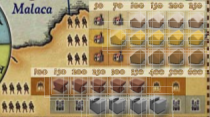 The player has 7
workers and the
available buildings
are depicted above.
The player could
for instance build
1 gold factory and
1 shipyard; in this
case he would pay
220 Cruzados to the
bank (70+150). He could as well build 2 gold factories, or 1
gold and 1 spice factory, paying in both cases 170 Cruzados.
But as he has only 7 workers, he could not build 2 shipyards
(4+4=8). If he wanted to build a church, he could not build a
second building at the same time.
The player has 7
workers and the
available buildings
are depicted above.
The player could
for instance build
1 gold factory and
1 shipyard; in this
case he would pay
220 Cruzados to the
bank (70+150). He could as well build 2 gold factories, or 1
gold and 1 spice factory, paying in both cases 170 Cruzados.
But as he has only 7 workers, he could not build 2 shipyards
(4+4=8). If he wanted to build a church, he could not build a
second building at the same time.
Market
For every type of goods a player can either sell goods with
his colonies, or process goods with his factories. When selling
goods, for each unit sold the player receives the current market
price indicated by the price marker in that color. After selling the
price marker is moved as many steps downward. When processing goods,
for each unit processed the player receives the price indicated in
the rightmost column. After processing, the marker is moved as many
steps upward. The starting factory is a joker and can process
any type of goods that is not sold in this round.
The player may sell goods with his colonies and take goods from the
market to process them with his factories. The number of colonies
and factories remains unchanged when selling or processing goods.
Selling goods with colonies
For each colony 1 respective unit of goods may be sold on the
market. For each unit sold the player receives its current price on
the market. After that, the price marker moves down as many fields
on the market as units have been sold. If the price marker reaches
the bottom line it simply stays there, but further sales of units are
still possible.
Processing goods with factories
For each factory 1 respective unit of goods may be processed. White
factories process sugar, yellow factories gold, and brown factories
process spices. The starting factory (orange) works as a wildcard
and can be used to process 1 unit of any type. All units
to be processed are taken from the market, therefore it is not
necessary to own colonies of the same type.
For each processed unit the player receives income from
the bank amounting to as many Cruzados as are shown inside the red
(rightmost) column corresponding to the price marker’s current position.
After receiving the total
income, the price marker moves a number of fields up equal
to the number of units that have been processed. If the price
marker reaches the highest line of its column it simply stays
there, but further processing of units is still possible.
Selling and processing
The decision whether to sell or to process is taken separately for
every type of goods. It is possible to sell one type and process the
other, but it is not possible to process and sell goods of the same type
at the same time. Of course players may decide to sell or process
only a subset of the possible units, in order to influence the prices
on the market for their future plans.
 Example selling goods with colonies
Example selling goods with colonies
The player owns 3 gold colonies and sells at the depicted
price of 50 Cruzados (although the current price is
covered by the marker, it still can be read because every
number occurs twice). He receives 150 Cruzados (3x50)
out of the bank and the price marker moves down onto the
upper “30”. If the player would sell from 5 gold colonies,
he would receive 250 Cruzados and the marker would
reach the bottom line. The next player on the market
would now receive only 30 Cruzados per sold unit of gold.
A complete market action



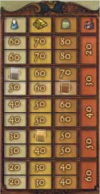 The player’s 3 colonies and
4 factories, along with the
current prices on the market,
are depicted. He sells 2 units
of gold for 40+40=80 and
1 unit of spices for 70
Cruzados. Gold and spices thus cannot be
processed in the same turn. Thus his gold
factory cannot be used and his orange
factory may only process sugar. He
processes 3 units of sugar receiving a
revenue of 3x30=90. The total payment from
the bank is 80+70+90=240 Cruzados. The
new prices are depicted to the right.
The player’s 3 colonies and
4 factories, along with the
current prices on the market,
are depicted. He sells 2 units
of gold for 40+40=80 and
1 unit of spices for 70
Cruzados. Gold and spices thus cannot be
processed in the same turn. Thus his gold
factory cannot be used and his orange
factory may only process sugar. He
processes 3 units of sugar receiving a
revenue of 3x30=90. The total payment from
the bank is 80+70+90=240 Cruzados. The
new prices are depicted to the right.
As an alternative, the player may process 2
units of gold with his factories for a total of
100, instead of selling gold with his colonies.
Together with 2 units of sugar processed for
60, and one unit of spices sold for 70 , he then
would earn a total of 230 Cruzados. Although
he would earn 10 Cruzados less now, there
may be a chance to sell his gold for a better
price later on.
Privilege
Privileges increase the multiplier for one of the
point categories colonies, factories, explorers, shipyards or
churches. Additionally the player receives a one-time bonus that
depends on how many such privileges and items of the category
the player already owns. The player choose one of the available
categories, and pays one worker. It is not allowed to have
less than 2 workers, and a player can have no more than
3 privileges in each category.
On top of the game board is a gallery with five different historic
persons, whose privileges give a cash bonus at once and victory
points (VPs) at the end of the game.
The player loses 1 worker in Lisboa and chooses one privilege
currently available on the game board in return. The privileges
reward the possession of (from left to right) colonies, factories,
explorers, shipyards, and churches.
On every turn, no more than only one privilege token can be
taken. The privilege is placed onto his player sheet in the highest
possible position of the appropriate column showing a bonus, which
decreases with every additional privilege. The newly covered bonus
is multiplied with the number of respective achievements (colonies,
factories, explorers, shipyards, churches) and the result is paid to
the player from the bank.
Each player can take no more than 3 privileges per type during the
game. If a player has only 2 workers, he cannot take a privilege
either, because players must always have at least two workers in
Lisboa.
Example taking a privilege
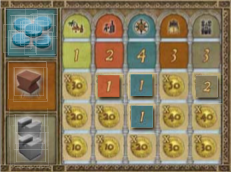 The gallery still
contains every
type of privileges.
The player pays
with 1 worker and
takes a church
privilege. As he
already owns
one privilege
of this type, the
new privilege
is placed in the
second position
from above, showing a bonus of “40”. For his 2 churches he
receives a bonus of 80 Cruzados (40+40) out of the bank. If he
had taken an explorer privilege instead, he would have received
5x20=100 Cruzados, and for a shipyard privilege 50 Cruzados.
In the first column the respective bonus would have been 30 per
colony, and in the second column 20 per factory.
The gallery still
contains every
type of privileges.
The player pays
with 1 worker and
takes a church
privilege. As he
already owns
one privilege
of this type, the
new privilege
is placed in the
second position
from above, showing a bonus of “40”. For his 2 churches he
receives a bonus of 80 Cruzados (40+40) out of the bank. If he
had taken an explorer privilege instead, he would have received
5x20=100 Cruzados, and for a shipyard privilege 50 Cruzados.
In the first column the respective bonus would have been 30 per
colony, and in the second column 20 per factory.
Hints for handling
Action selection
The default configuration allows you to choose
actions by clicking on the corresponding section
on the rondel. Sections which are highlighted in
green can be chosen without costs, sections which
are highlighted in red cost at least 1 ship.
If you can choose the Navegador, the Navegador
image is displayed in the center of the rondel.
If you click on the image, you can execute the
extra Sailing action.
If you prefer to choose your actions via a popup
dialog, you can configure that in the side panel
(click there on the heart icon) and choose
"Action selection via dialog".
Market
On the market the potential final marker positions
resulting from the market action are shown with a blue
border. This final position usually indicates how many
units of the type of goods are sold or processed. If the price
marker is moved to the topmost position (or if it is
already there) it is assumed that the player wants to
process as many such goods as possible. If the price
marker is moved to the bottommost position, it is assumed
that the player wants to sell as many such goods as possible.
Below the market the current earnings are shown based on the
selected new positions of the price markers.
Clicking on the "Trade" button in the lower right corner
of the window performs the trade.
There is one edge case when the price marker is moved
to the topmost position or if it is already there:
It is not possible to tell if the user also wants to use
his orange factory for that type of goods. If the orange
factory is not explicitly used for any other type of goods,
it will be automatically used for one type of goods for which the
price marker is in the topmost position. This is already included
in the calculated earnings shown below the market, but not
included in the calculation that is shown when you move your
mouse over the topmost position.
Privileges
Above the available privileges the bonus is shown that the player
would receive in case he takes the privilege below. In the player
info the current points per item in the point categories is shown.
Each privilege taken increases the multiplier by 1 (or 2 in case of
shipyard or church privileges). The king's privilege is automatically
assigned when the game ends in such a way as to maximize the final
points of the player.
When playing with the variant "King's privilege in Goa", the King's
privilege is shown in the player info in case it has not been "collected"
yet. If the player has a choice to take this privilege, a blue border
will appear and it becomes clickable.
Sailing
When performing the action "Sailing", first click on the region
where a ship should depart, and then choose the final destination
for the ship. If the final destination is an unexplored region, you
will be asked to choose another region from which a ship should
sail to that same destination, because you need to have at least
2 ships when sailing into an unexplored region.
If this choice is unique, it will be done automatically.
To reveal the colonies in the unexplored region, you have to
click on the explorer disk. This action cannot be taken back, and
therefore is never executed automatically.
Player info
When playing with many players, it might make sense to switch the display
to show only one player info at a time. This can be done by clicking
on the heart icon in the side panel, and then choosing "Tabbed view".
Alternatively (if you don't want to change the setting for all your Navegador games)
you can click on the tab symbol in the title bar.
In the player info you can see in the upper right your current points.
The number in parentheses is the number of points including the points
for workers, ships, money and the king's privilege.
In the row below you can see the number of Cruzados, ships and explorers
of a player. Also the Navegador card can be seen in case the player currently has it.
In the third row the three types of colonies of a player are shown. Since
only the number of colonies of a type are relevant, you can't see the prices
at which the individual colonies have been bought. After the colonies, you
can see what the currently optimal assignment of the king's privilege is.
In the fourth row you can see the buildings of a player, first the factories
of the three types of goods, then the joker start factory, then the shipyards
and the churches.
In the last row the current multipliers for the point categories are listed.
The starting values are:
1x (colonies), 2x (factories), 4x (explorers), 3x (shipyards), 3x (churches).
When clicking on a privilege image, you can see those starting values,
as well as the number of privileges of that type, how many items of this
point category the player owns, and what the next bonus payment would be
when the player collects another such privilege.